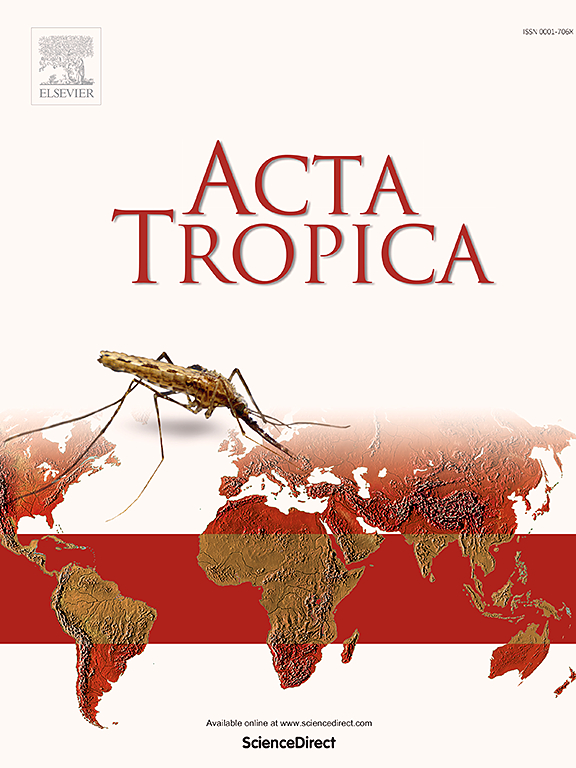右硝唑烷对冈比亚按蚊微孢子虫的有效防治作用
IF 2.1
3区 医学
Q2 PARASITOLOGY
引用次数: 0
摘要
微孢子虫一直被认为是控制病媒及其传播的寄生虫的生物制剂。然而,由于在宿主内操纵微孢子虫的挑战,他们在媒介生物学方面的研究受到了限制。在本研究中,我们研究了抗微孢子虫病的候选药物Dexrazoxane对culicvavraa在其天然宿主冈比亚按蚊(主要疟疾媒介)中建立和发展感染的影响。我们的研究结果表明,Dexrazoxane显著降低了孢子载量,特别是在单独饲养的蚊子中,而不影响寄生虫的整体感染成功。这一结果与秀丽隐杆线虫的研究相一致,在该研究中,Dexrazoxane抑制新孢子的产生,而不阻碍初始孢子融入宿主肠道细胞。Dexrazoxane的DNA拓扑异构酶II抑制剂机制可能解释了它对蚊子发育的影响,因为接触该药物的幼虫未能长成成虫。这些发现突出了Dexrazoxane作为控制成蚊微孢子虫的可行工具的潜力,并希望加强蚊子与微孢子虫相互作用的研究。需要进一步研究以探索其在包括疟疾在内的病媒传播疾病控制方面的更广泛应用。本文章由计算机程序翻译,如有差异,请以英文原文为准。
Dexrazoxane as a viable microsporidia control agent in Anopheles gambiae
Microsporidia have long been proposed as biological agents for controlling disease vectors and the parasites they transmit. However, their study in vector biology has been constrained due to challenges in manipulating microsporidia within hosts. In this study, we investigated the effect of Dexrazoxane, a candidate drug against microsporidiosis, on the establishment and development of Vavraia culicis infection in its natural host, the mosquito Anopheles gambiae, the main malaria vector. Our findings show that Dexrazoxane significantly reduces spore load, particularly in mosquitoes reared individually, without affecting the overall infection success of the parasite. This result aligns with studies in Caenorhabditis elegans, where Dexrazoxane inhibited new spore production without hindering initial spore integration into the host gut cells. Dexrazoxane's DNA topoisomerase II inhibitor mechanism likely explains its impact on mosquito development, as larvae exposed to the drug failed to emerge as adults. These findings highlight Dexrazoxane's potential as a viable tool for controlling microsporidia in adult mosquitoes and hope to enhance the study of mosquito-microsporidia interactions. Further research is required to explore its broader application in vector-borne disease control, including malaria.
求助全文
通过发布文献求助,成功后即可免费获取论文全文。
去求助
来源期刊

Acta tropica
医学-寄生虫学
CiteScore
5.40
自引率
11.10%
发文量
383
审稿时长
37 days
期刊介绍:
Acta Tropica, is an international journal on infectious diseases that covers public health sciences and biomedical research with particular emphasis on topics relevant to human and animal health in the tropics and the subtropics.
 求助内容:
求助内容: 应助结果提醒方式:
应助结果提醒方式:


